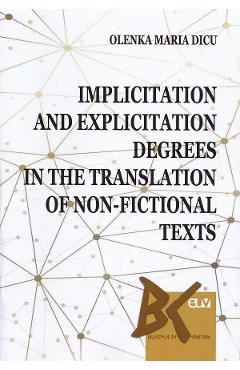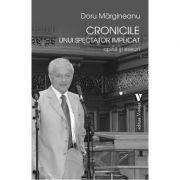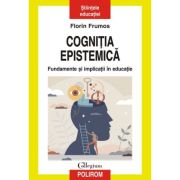- Informatii telefonice:(+40) 748 400 200
Implicitation and Explicitation Degrees in the Translation of Non-Fictional Texts - Olenka Maria Manescu
Cod intern: xsales_11539319Vizualizari: 17 / Achizitii: 11
Pret: 126.0 RON
Acest produs este publicat in categoria Librarie la data de 10-10-2023: 10:10 si vandut de Libris. Vanzatorul isi asuma corectitudinea datelor publicate. ( alege finantarea potrivita )
-
Produs cu garantie
-
Livrare direct din stocul fizic al Libris
-
Retur gratuit minim 14 zile de la data achizitiei
The book harmoniously integrates linguistic and translation-oriented approaches, in search for patterns of identity construction of the tourism advertising discourse. Equally, the book should be credited for the promotion of advertisements as a type of non-fictional texts with undeniable cultural value, and for the development of benchmarks in the translation of these texts in order to meet the criteria of efficiency and effectiveness. The originality and innovative character of the book consist, above all, in the simultaneous approach to the complex issues of implicitation and explicitation in translation, explicitation being a phenomenon of broad interest to researchers, whereas implicitation has been studied incidentally so far. -Professor Titela Vîlceanu, PhD, University of Craiova The book is praiseworthy for several reasons: first of all, investigated topic, especially in the current context of globalization, adds up to few available studies of the translation norms of the tourism advertising discourse; secondly, the specificity of the language used in the field of tourism is characterized by a high degree of difficulty generated by the cultural dimension, and by combining both informative and communicative purposes, with a specific organization of the information. Translations of this type of texts/discourse fall into the category of specialized translation, but differ from other translations of specialized texts by the high degree of difficulty in terms of rendering the cultural component and brevity in conveying the message while also securing the impact on the target readership. - Professor Elena Croitoru, PhD, "Lower Danube" University of Galati The tourism industry is now in full swing and makes continuous attempts to discover and exploit the motivation behind the decision to travel. Olenka Maria Dicu proposes, and successfully achieves, an academic investigation of the tourism advertising discourse, focused on the efficiency and extent to which implicitation and explicitation techniques occur during the translation of tourism advertising discourse. To this end, the author adopts a functional approach to translation, which aims to maintain the persuasive dimension of the translated version. The book is an interdisciplinary study of nonfictional texts, more particularly of tourism advertising practices based not only on linguistic patterns and theories of translation, but also on socio-cultural considerations. - Associate Professor Ana-Maria Herzal, PhD, University of Craiova











Scrie parerea ta
Implicitation and Explicitation Degrees in the Translation of Non-Fictional Texts - Olenka Maria Manescu
Ai cumparat produsul Implicitation and Explicitation Degrees in the Translation of Non-Fictional Texts - Olenka Maria Manescu ?
Lasa o nota si parerea ta completand formularul alaturat.
The book harmoniously integrates linguistic and translation-oriented approaches, in search for patterns of identity construction of the tourism advertising discourse. Equally, the book should be credited for the promotion of advertisements as a type of non-fictional texts with undeniable cultural value, and for the development of benchmarks in the translation of these texts in order to meet the criteria of efficiency and effectiveness. The originality and innovative character of the book consist, above all, in the simultaneous approach to the complex issues of implicitation and explicitation in translation, explicitation being a phenomenon of broad interest to researchers, whereas implicitation has been studied incidentally so far. -Professor Titela Vîlceanu, PhD, University of Craiova The book is praiseworthy for several reasons: first of all, investigated topic, especially in the current context of globalization, adds up to few available studies of the translation norms of the tourism advertising discourse; secondly, the specificity of the language used in the field of tourism is characterized by a high degree of difficulty generated by the cultural dimension, and by combining both informative and communicative purposes, with a specific organization of the information. Translations of this type of texts/discourse fall into the category of specialized translation, but differ from other translations of specialized texts by the high degree of difficulty in terms of rendering the cultural component and brevity in conveying the message while also securing the impact on the target readership. - Professor Elena Croitoru, PhD, "Lower Danube" University of Galati The tourism industry is now in full swing and makes continuous attempts to discover and exploit the motivation behind the decision to travel. Olenka Maria Dicu proposes, and successfully achieves, an academic investigation of the tourism advertising discourse, focused on the efficiency and extent to which implicitation and explicitation techniques occur during the translation of tourism advertising discourse. To this end, the author adopts a functional approach to translation, which aims to maintain the persuasive dimension of the translated version. The book is an interdisciplinary study of nonfictional texts, more particularly of tourism advertising practices based not only on linguistic patterns and theories of translation, but also on socio-cultural considerations. - Associate Professor Ana-Maria Herzal, PhD, University of Craiova
Acorda un calificativ